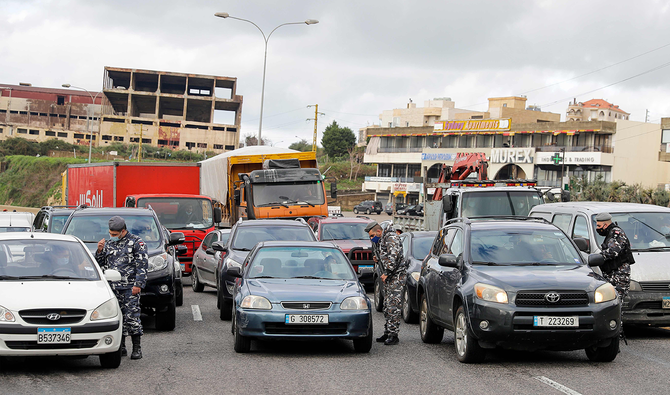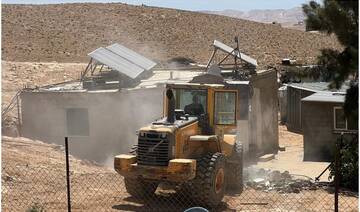BEIRUT: The Lebanese Health Ministry’s Scientific Committee on Combating the Coronavirus Pandemic has recommended extending lockdown by at least two weeks.
In the past week, the country registered a new record for daily coronavirus disease (COVID-19) cases. More than 78,812 cases were recorded in the past 20 days, which has led doctors to conclude that Lebanon has lost control over the virus.
Sixty-one new deaths were announced on Tuesday, a record high in Lebanon. The Higher Defense Council is expected to hold an emergency session on Thursday to assess the situation.
On Wednesday, taxi drivers clashed with soldiers in front of the Rafic Hariri International Airport in Beirut. Taxi drivers had previously blocked the road leading to the airport with their vehicles, protesting the effect of lockdown measures on their work.
The army intervened to reopen the road. Some protesters were injured after being beaten with rifle butts.
The airport’s security command said: “Due to the lockdown and curfew in place, taxi drivers are banned from operating without permission. The current measures to transport travelers at the airport are temporary and everything will go back to normal once the lockdown is over. However, the command will not allow the airport’s security to be jeopardized for any reason.”
Bshara Al-Asmar, head of the General Labor Union, said: “As health and official authorities are insisting on extending the lockdown period, the Lebanese state, bodies and ministries must coordinate with the union, economic commissions and civil society to find a mechanism to support employees and daily workers of the private sector who are not getting paid during the lockdown, as well as daily and hourly-paid workers in the public sector, low-income and self-employed persons who depend on their daily work to earn their living.”
Al-Asmar urged officials to “expedite the government’s formation to achieve a minimum of political stability, which would pave the way for the economic reforms the country urgently needs, as poverty and unemployment have reached every Lebanese house.”
Dr. Firas Al-Abyad, director of the Hariri Governmental University Hospital, stressed “the need to adopt and abide by extremely strict containment measures and implement effective and fast measures to track down the infected persons and those who have had contact with them, instead of only focusing on the numbers of available beds in hospitals.”
Pending the decision of any lockdown extension, Hani Bohsali, head of the Syndicate of Importers of Foodstuffs in Lebanon, has called on “relevant authorities not to improvise or rush into any decisions, especially those related to food security of citizens.”
Bohsali added: “Seven days after the beginning of the lockdown, the demand of food items, especially vegetables, bread and dairy products, has dramatically decreased, which is not the result of citizens’ decreasing need as much as their inability to buy the food items they need, after they have disappeared from the shelves.”
Bohsali also shed light on the incapacity of “delivery services, especially in supermarkets across Lebanon, to meet the needs of Lebanese.”
He warned that “extending the lockdown and keeping supermarkets closed will increase citizen’s needs of foods and goods, which will eventually lead to congestion and overcrowding in supermarkets.
“This will be a similar situation to before the lockdown, risking citizens’ health again.”



























